The “dating for dinner” trend isn’t exactly new. Many have heard whispers about women going on dates not just for the vibes, but for the entrée too. But lately, TikTok has been buzzing with a resurgence of this age-old tactic, and it’s got some people wondering if this is just about free food, or if it’s a symptom of something bigger like the looming shadow of a recession?
The Return of an Old Trend, With New Motivation?
Search “dating for dinner” on TikTok and you’ll see hundreds of videos with millions of views. Some creators are tongue-in-cheek about it, posting clips of themselves getting glammed up to go on a “Hinge dinner date” with captions like “girl math: I saved $45 and got sushi.” Others are more direct, sharing their strategies for making it through the week without spending a dime on groceries. Behind the humor is a reality you can’t ignore. Things are expensive. Rent is up, groceries are up, even your morning coffee runs are signs of inflation. According to the U.S. Bureau of Labor Statistics, food prices have risen more than 20 percent in just the past few years. So when a $20 Bumble date equals a full meal, some women are doing the math and making it add up.
Is Dating for Dinner a Recession Indicator?
In the past, subtle changes in social behavior have acted as unofficial indicators of economic stress. Just like the rise of DIY beauty during the 2008 financial crisis or the surge in resale apps during the early pandemic years, dating behavior can also shift when people feel financially squeezed. The renewed popularity of dating for meals may be one of those quiet signals that money is starting to become a glaring issue. Rather than being driven by opportunism, this trend could be seen as a reflection of the survival mindset that many millennials and Gen Zers have been forced to adopt. It’s a way of navigating a system where inflation, wage gaps, and job instability are very real factors. What looks like fun and games on TikTok might actually be a subtle form of economic adaptation.
Scams or Survival?
Not everyone views this trend with compassion or nuance. There’s a growing backlash online from those who feel it’s ethically questionable. Some claim it undermines the spirit of genuine connection, while others accuse it of being manipulative. There’s also a gendered undertone to much of the criticism, with women often being scrutinized for making dating work to their benefit while its normalized amongst many men.
At its core, the controversy highlights how differently people view transactional dynamics in dating. Some believe there should be emotional authenticity tied to every date, while others see dating as inherently transactional, whether it’s about time, effort, or money. When economic survival enters the mix, the lines between those views become even more blurred.
Why Some Women Are All for Dating for Dinner
For some, “dating for dinner” isn’t just about saving money. It’s about reclaiming time and choice in a space that hasn’t always been kind. If there’s a tangible benefit, like a quality meal, some women see that as a fair exchange for their time. “Dating for dinner” might seem like a punchline at first glance, but it’s touching on something deeper: how economic hardship is reshaping the way people approach intimacy, value, and survival. Whether you find the trend controversial or clever, it’s worth asking why more women are leaning into it now and what it says about the financial and social expectations placed on them.
